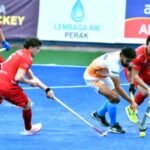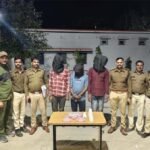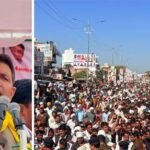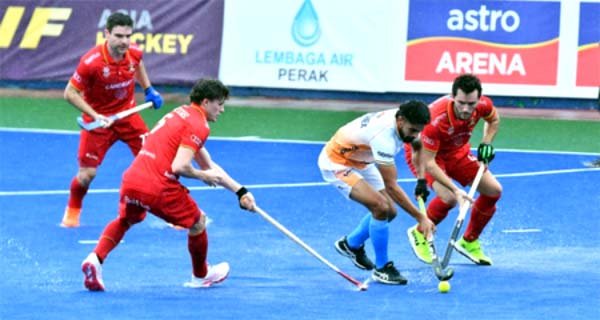Thiruvananthapuram, Oct 14 (UNI) Reaffirming that Bharat was neither born in 1947 nor created by the British, Prajna Pravah National Coordinator and senior RSS leader J. Nandakumar has described Dr. Syama Prasad Mookerjee as “the living voice of India’s civilizational selfhood — a patriot who viewed the nation as an eternal cultural entity, not a political artifact.”
Delivering the Dr. Syama Prasad Mookerjee Memorial Lecture at the Kerala Raj Bhavan Auditorium as part of the 125th Birth Anniversary Celebrations organized by the Dr. Syama Prasad Mookerjee Research Foundation (SPMRF), Nandakumar said that Dr. Mookerjee’s ideological foundations were “firm, fearless, and uncompromising.”
Rejecting the colonial narrative that India became a nation after Independence from the British, Nandakumar said, “Dr. Mookerjee was emphatic that Bharat’s nationhood was not a product of 1947, but a continuation of an ancient civilizational unity that has survived centuries of invasion, oppression, and division.”
Quoting Mookerjee’s 1949 statement, he reminded, “Our nationality is not a mechanical concept; it is a living force that has survived through millennia because of our culture — not in spite of it.”
Nandakumar stressed that the cornerstone of Mookerjee’s political vision lay in the distinction between territorial nationalism and cultural nationalism.
“He believed Bharat was not created by the British withdrawal but had existed since the dawn of civilization — nourished by Dharma, sustained by its culture, and bound by a shared spiritual identity,” he said.
As Minister for Industry and Supply in the Nehru Cabinet, Dr. Mookerjee, Nandakumar recalled, laid the foundation for ‘Swadeshi in modern form’, linking economic self-reliance with national dignity.
“He warned that industrialization divorced from self-reliance is only another form of dependence,” he said, adding that Mookerjee’s ideas anticipated the Aatmanirbhar Bharat vision of today.
Dr. Mookerjee’s proposal for national boards for steel, coal, and shipping, later adopted by successive governments, reflected his visionary approach. “He was a leader who combined economic pragmatism with cultural rootedness,” Nandakumar observed.
Referring to Mookerjee’s historic resignation from Nehru’s Cabinet over the Delhi Pact with Pakistan, he said, “His resignation was not a political act of dissent but a moral stand based on Dharmic conviction.”
Quoting his parliamentary intervention, Nandakumar recalled his words: “Why should Hindus in East Pakistan continue to live in fear while we remain silent in the name of secularism?”
In his resignation letter, Mookerjee had declared, “You cannot build national unity by appeasing those who deny the very basis of our civilizational oneness.”
“Nationhood, for him, was a matter of selfhood, not statehood,” Nandakumar noted. “He belonged to the Chirarashtravadi school- those who see Bharat as an eternal nation, not a creation of colonial history.”
Contrasting the Bharatiya concept of Rashtra with the Western model of nationhood, Nandakumar said the West viewed the State as preceding the Nation, while Bharat’s nationalism evolved from culture, Dharma, and spiritual consciousness.
“Western nationalism was political and competitive; Bharatiya nationalism is cultural and compassionate- built on harmony, inclusivity, and humanism,” he emphasized.
Tracing the lineage of this thought from Swami Vivekananda to Pandit Deendayal Upadhyaya, Nandakumar said, “Both envisioned Bharat’s mission not as domination, but as the spiritualization of humanity. From Vivekananda’s call for Tyaga and Seva to Deendayal Ji’s Ekatma Manav Darshan (Integral Humanism), the message remains one – Bharat’s strength lies in her culture, not conquest.”
He said Dr. Mookerjee’s struggle found its ultimate vindication when Article 370 was abrogated in 2019, fulfilling his historic call — “Ek desh mein do vidhan, do pradhan, aur do nishan nahi chalenge.”
“Atal Bihari Vajpayee rightly said that Dr. Mookerjee’s sacrifice was not in vain – his voice became the conscience of the nation,” Nandakumar remarked.
Drawing parallels between Mookerjee’s ideals and contemporary India, he said Bharat’s global resurgence – from the worldwide embrace of Yoga to humanitarian diplomacy is rooted in the same civilizational confidence that Mookerjee embodied.
“Dr. Syama Prasad Mookerjee was not the echo of an age gone by; he remains the voice calling us to build a strong, self-reliant, and united Bharat. He proved that one can be modern without losing one’s roots — contemporary without being deracinated,” Nandakumar concluded.
Kerala Governor Rajendra Vishwanath Arlekar, the Chief Guest at the event, paid glowing tributes to Dr. Mookerjee’s contributions as an educationist, administrator, and patriot who upheld national integrity even at the cost of his life.
Describing the lecture as “a fantastic and inspiring interpretation of nationhood,” the Governor said it offered a profound reminder of “what we have to be as a nation and what we must establish through the ideal of Chirarashtravad — the concept of an eternal nation.”
He said the lecture presented “a novel idea of Rashtravad — a vision of nationhood rooted in culture, continuity, and collective duty.”
“This lecture reminds us of our responsibility – as individuals and as citizens – to strengthen the idea of Bharat that Dr. Mookerjee stood for,” Arlekar said.
“Chirarashtravad is not just a philosophical idea; it is a living commitment to preserve and advance our civilizational essence.”
He emphasized that nation-building requires coordination, direction, and shared purpose, urging every individual to contribute meaningfully to society.
“Our nation needs not only pride but also responsibility. A nation has to deliver to society, and every person has to deliver to the nation he said.
The Governor called on citizens, institutions, and organizations to work collectively toward realizing Dr. Mookerjee’s vision of a self-reliant, culturally grounded Bharat.
“True patriotism lies not merely in words but in action- in how we serve society, uphold our values, and fulfill our duties as part of this great civilization,” he observed.
Concluding his address, the Governor praised the intellectual and cultural depth of the lecture, calling it “a timely reflection on what Bharat truly represents – a civilization that has endured for millennia and continues to inspire humanity.”
In his introductory remarks, Prof. P. Kanagasabapathi, Secretary and Trustee of SPMRF, hailed Mookerjee’s “rare blend of intellect, courage, and conviction,” recalling his appointment as the youngest Vice-Chancellor of Calcutta University at 33 — earning praise from Rabindranath Tagore for being “modern but not deracinated.”
As the event concluded here yesterday with the resonant chant of “Jai Hind,” the audience was reminded that Dr. Syama Prasad Mookerjee is not merely a historical figure but a living idea — the embodiment of Bharat’s civilizational continuity, self-reliance, and spiritual mission to guide humanity.











